In today's fast-paced business environment, the effective management of supply chains has become increasingly important for businesses looking to stay competitive. Supply chain management encompasses all of the processes involved in the creation & distribution of a product or service, from the sourcing of raw materials to the delivery of the final product to the end customer. One tool that has proven to be particularly effective in managing supply chains is Enterprise Resource Planning (ERP) software. In this article, we'll explore the benefits of utilizing ERPNext services for supply chain management and how it can help businesses streamline their operations, increase visibility, and improve overall efficiency.
What is a Supply Chain?
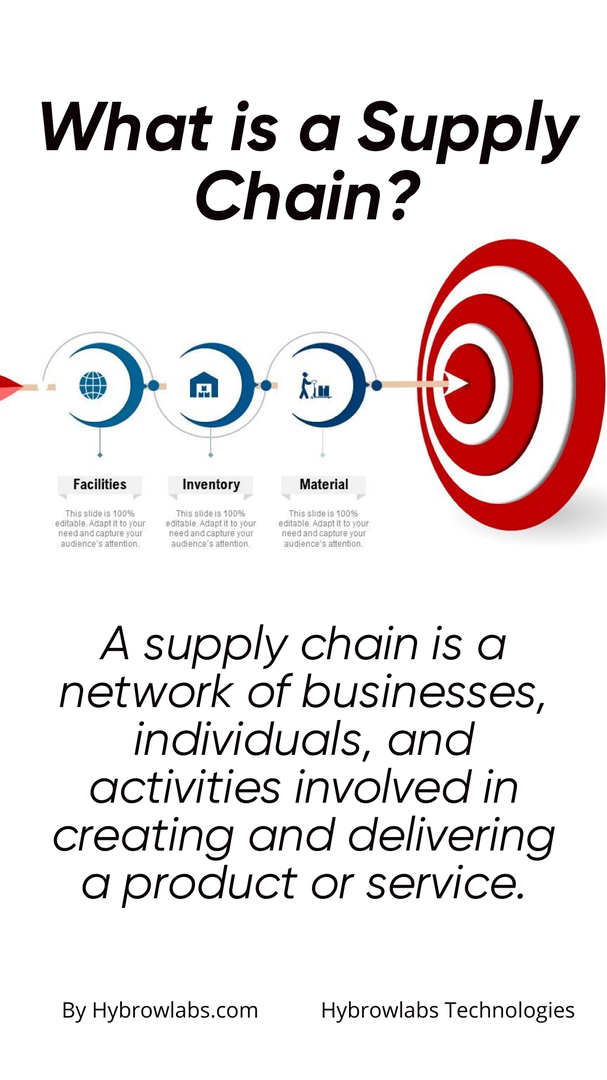
A supply chain is a network of businesses, individuals, & activities that are involved in the creation & delivery of a product or service. It encompasses all of the processes involved in the creation, sourcing, production, & delivery of goods & services to customers. A typical supply chain includes suppliers, manufacturers, distributors, retailers, & end customers, & it involves the movement of raw materials, goods, & information between these various entities. Effective supply chain management is essential for businesses looking to make sure that their products are delivered to customers on time, at the right price, & with the desired level of quality.
What Is the Role of an ERPNext Service in Supply Chain Management?
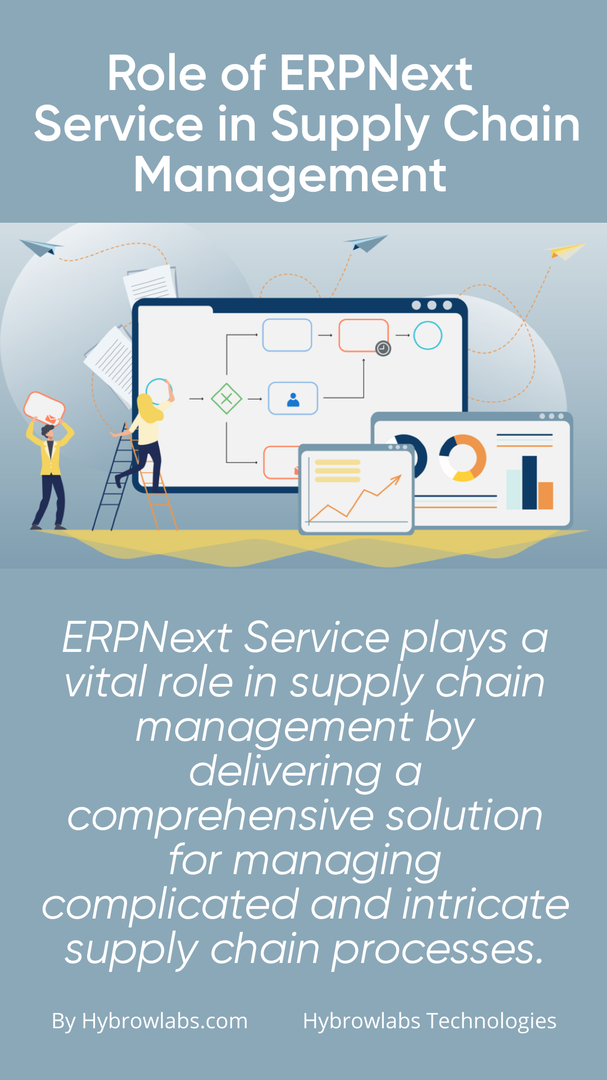
Enterprise Resource Planning (ERP) software has revolutionized the way businesses operate, especially in supply chain management. ERP solutions have made it attainable to integrate various business processes into a single, unified system, enabling better inventory management, improved customer relationship management, regulatory compliance, & asset management.
An ERPNext service plays a vital role in supply chain management, as it delivers a comprehensive solution for managing complicated & intricate supply chain processes. ERP systems help in streamlining various aspects of supply chain management. ERP solutions can optimize supply chain processes, reducing lead times, minimizing inventory costs, and& improving operational efficiency. ERP systems can also help businesses to manage relationships with suppliers, customers, & regulatory bodies, ensuring compliance with regulations & standards.
Benefits of Using ERPNext Service in a Supply Chain Management Strategy:
ERPNext Service is a software solution that can be highly profitable to organizations in supply chain management. Here are some of the key benefits of using ERPNext Service in a supply chain management strategy:
1. Efficient Managing Demand & Procurement:
ERPNext Service provides a centralized platform for managing demand & procurement, enabling organizations to optimize their supply chain operations. The solution helps organizations to manage optimal inventory levels, improve demand forecasting accuracy, & decrease lead times. It also streamlines the procurement process by automating purchase orders, invoices, & payment processing.
2. Reliable Processing & Documentation:
ERPNext Service helps to confirm reliable processing & documentation throughout the supply chain process. The solution enables organizations to standardize their processes, make sure compliance with regulations, & reduce the risk of errors.
3. Enhanced Collaboration:
ERPNext Service provides a platform for enhanced collaboration between various departments within an organization, as well as between various organizations within the supply chain. This enables better communication, collaboration, & coordination, leading to enhanced supply chain efficiency & effectiveness.
4. Increased Visibility:
ERPNext Service supplies real-time visibility into supply chain operations, enabling organizations to track inventory levels, monitor supplier performance, & identify potential issues before they escalate. This helps organizations to make informed decisions, improve responsiveness, & reduce the risk of stockouts or delays.
5. Cloud Capabilities:
ERPNext Service is a cloud-based solution that gives organizations with the flexibility & scalability to maintain their supply chain operations from anywhere, at any time. This enables organizations to adapt quickly to changing market conditions, reduce IT infrastructure costs, & improve business continuity.
How Does ERP Improve Supply Chain Management & Efficiency?
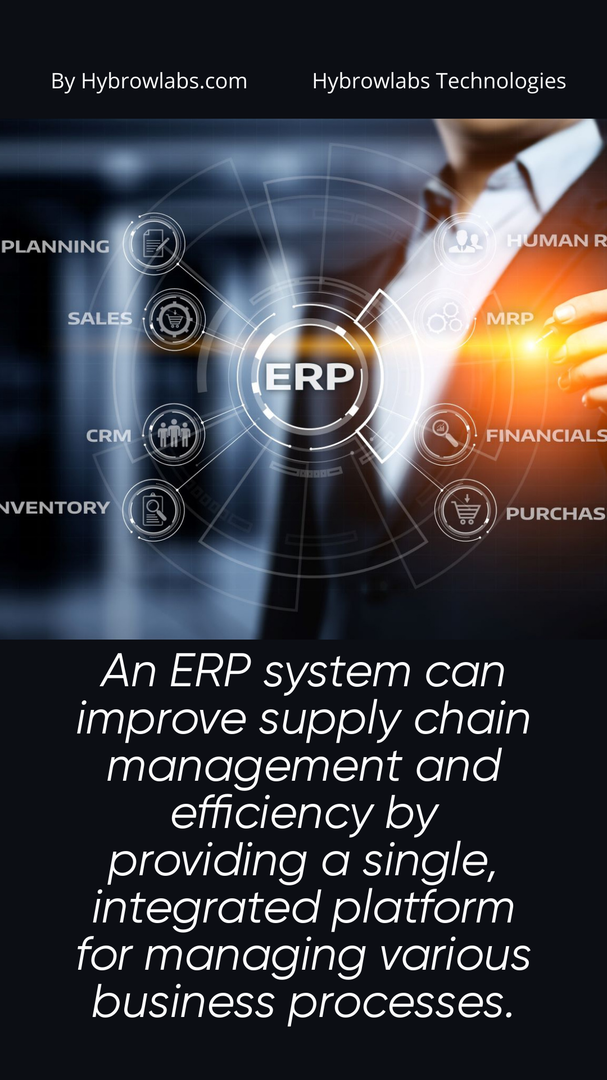
An ERP (Enterprise Resource Planning) system can improve supply chain management & efficiency by providing a single, integrated platform for managing various business processes. This enables better coordination & collaboration between different departments and stakeholders, leading to faster & more accurate decision-making. By automating & streamlining processes, an ERP system can reduce manual errors across the entire supply chain. This can help businesses to optimize their resources, reduce costs, improve customer service, and respond quickly to changes in market demand or supply chain disruptions.
How Does Your Business Benefit from Supply Chain Management with ERPNext Service?
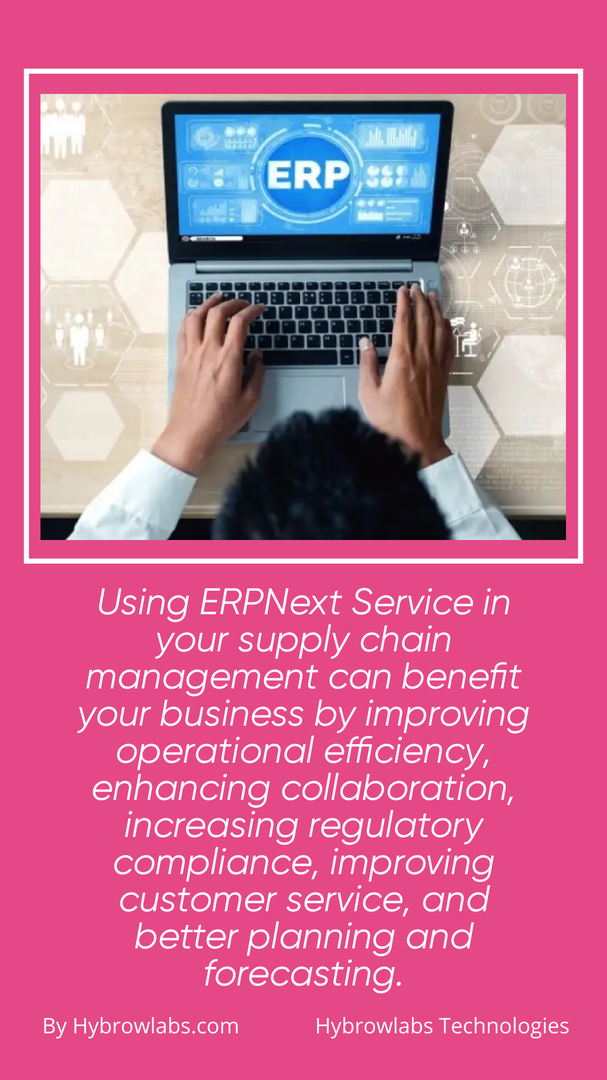
If you're looking to optimize your supply chain management, an ERPNext service can help your business in numerous ways. Here are some of the key benefits:
1. Improved Operational Efficiency:
With an ERPNext service, businesses can streamline their supply chain processes, decreasing lead times, minimizing inventory costs, & improving operational efficiency. ERP systems can automate tasks such as procurement, inventory management, & logistics, allowing businesses to concentrate on core competencies.
2. Better Planning and Forecasting:
ERPNext services can help businesses to predict demand accurately, plan production schedules, & manage inventory levels more effectively. With ERP, businesses can make informed decisions based on real-time data, resulting in better planning & forecasting.
3. Enhanced Collaboration:
ERP systems facilitate collaboration between different departments within an organization, enabling better communication & coordination. With ERP, businesses can improve communication between suppliers & customers, leading to better relationships & improved supply chain visibility.
4. Increased Regulatory Compliance:
ERP systems can help businesses ensure compliance with regulatory requirements & standards. With ERP, businesses can track & monitor compliance-related data, such as supplier certifications & product quality, confirming that products meet the required standards.
5. Improved Customer Service:
ERPNext services can help businesses to enhance customer service by reducing lead times, minimizing stockouts, & improving order fulfillment accuracy. With ERP, businesses can provide better visibility into the supply chain process, enabling customers to track the status of their orders.
The 3 Levels Of Supply Chain Management
Supply chain management is a complicated process that involves the coordination & integration of different activities to make sure the efficient & effective delivery of goods and services to customers. There are three distinct levels of supply chain management, including strategic, tactical, & operational.
1. Strategic Supply Chain Management:
Strategic supply chain management involves long-term planning and decision-making. It focuses on developing & implementing strategies that enable an organization to achieve competitive advantage & business success. This level of management involves establishing goals, selecting suppliers, designing distribution networks, & developing partnerships with suppliers & customers to enhance value creation & improve the overall supply chain performance.
2. Tactical Supply Chain Management:
Tactical supply chain management involves medium-term planning & decision-making. It focuses on implementing strategies & plans developed in the strategic phase. This level of management involves making decisions related to production planning, inventory management, demand forecasting, & managing supplier relationships. Additionally, tactical supply chain management focuses on optimizing transportation routes & ensuring regulatory compliance.
3. Operational Supply Chain Management:
Operational supply chain management involves short-term planning & decision-making. It focuses on the day-to-day activities that ensure the smooth operation of the supply chain. This level of management involves managing inventory levels, scheduling production, coordinating the movement of goods & services, and managing relationships with customers and suppliers to ensure timely delivery and high-quality service.
Each level of supply chain management is vital to ensure that the supply chain operates efficiently & effectively. Strategic decisions give the overall direction for the supply chain, tactical decisions ensure that plans are implemented properly, and operational decisions confirm that day-to-day activities are completed efficiently. This multi-level approach to supply chain management enables organizations to deliver high-quality products and services to their customers while remaining competitive in their respective industries.
Conclusion-
In conclusion, utilizing ERPNext services for supply chain management can give businesses a multitude of advantages. By integrating various business processes into a single platform, ERPNext can improve communication, collaboration, and decision-making across various departments and stakeholders. Ultimately, ERPNext can help businesses gain better supply chain management, increased profitability, and competitive advantage in their industry. If you're interested in exploring ERPNext services, you can check out Hybrowlabs ERPNext Developement services & Hybrowlabs Manufacturing ERPNext Services, which offer comprehensive solutions for businesses of all sizes.
FAQ-
1. What is ERP & how does it relate to supply chain management?
ERP (Enterprise Resource Planning) is a software system that helps manage a company's business processes, including supply chain management. An ERP system provides a single, integrated platform for managing various business functions, such as inventory management, production planning, purchasing, and logistics, to improve efficiency and productivity.
2. How can an ERP system improve inventory management?
An ERP system can improve inventory management by providing real-time visibility into inventory levels, tracking stock movement, and automating reordering processes. This allows businesses to optimize inventory levels, reduce stockouts, and improve customer satisfaction.
3. How can an ERP system help with order processing and fulfillment?
An ERP system can help with order processing and fulfillment by streamlining and automating the entire process, from order entry to shipping. It provides real-time visibility into order status and inventory levels, enabling businesses to fulfill orders faster and more accurately, reducing lead times and improving customer satisfaction.
4. What role does an ERP system play in supply chain collaboration?
An ERP system plays a crucial role in supply chain collaboration by providing a centralized platform for communication, collaboration, and data sharing between different departments and stakeholders. It enables businesses to share information, such as inventory levels, order status, and production schedules, in real-time, allowing them to work together to optimize supply chain performance and improve customer service.
5. What are some key features to look for in an ERP system for supply chain management?
Some key features to look for in an ERP system for supply chain management include inventory management, production planning, purchasing, logistics, order management, real-time data analytics, and integration with other systems, such as CRM or e-commerce platforms. The system should also be scalable, customizable, and provide excellent customer support and training.



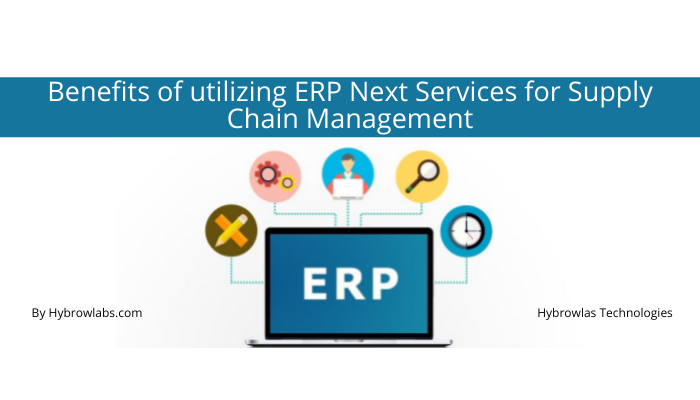


a3dc85.jpg)

.jpg)
fd8f11.png)

.jpg)
.jpg)